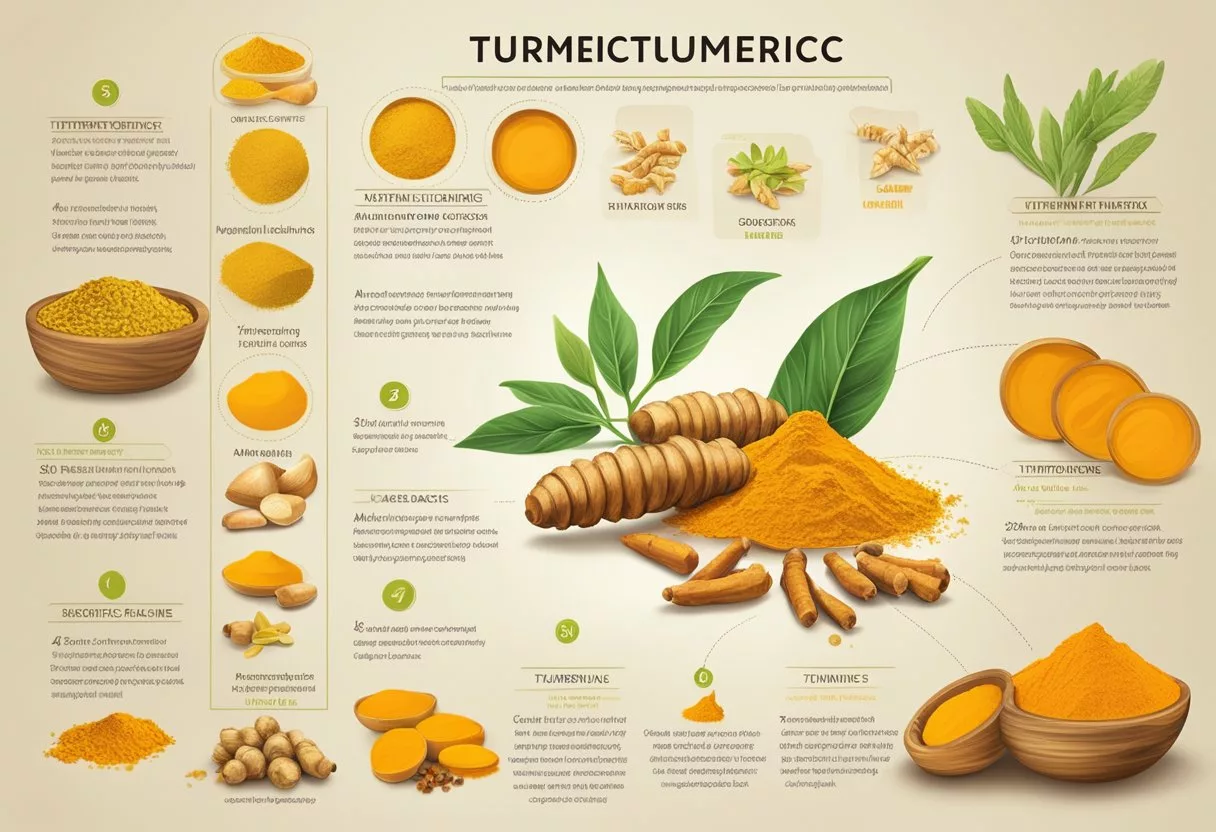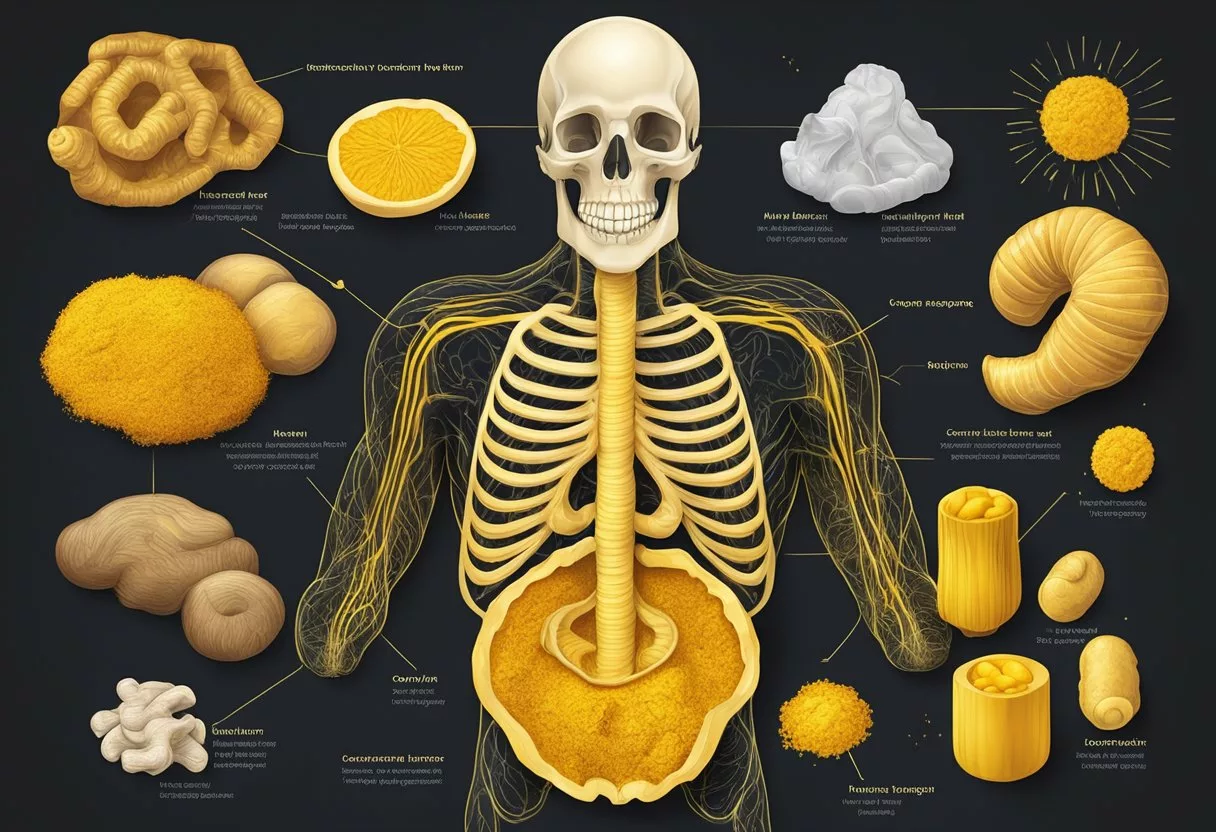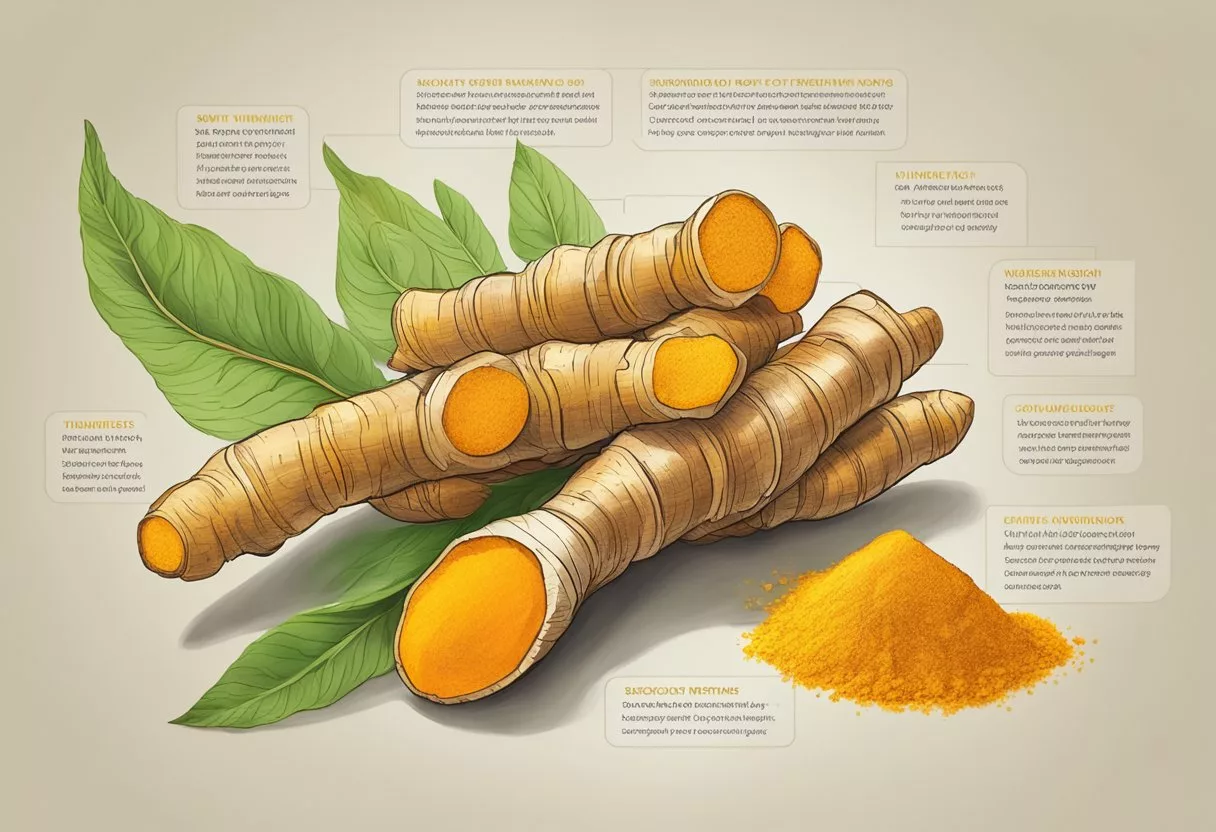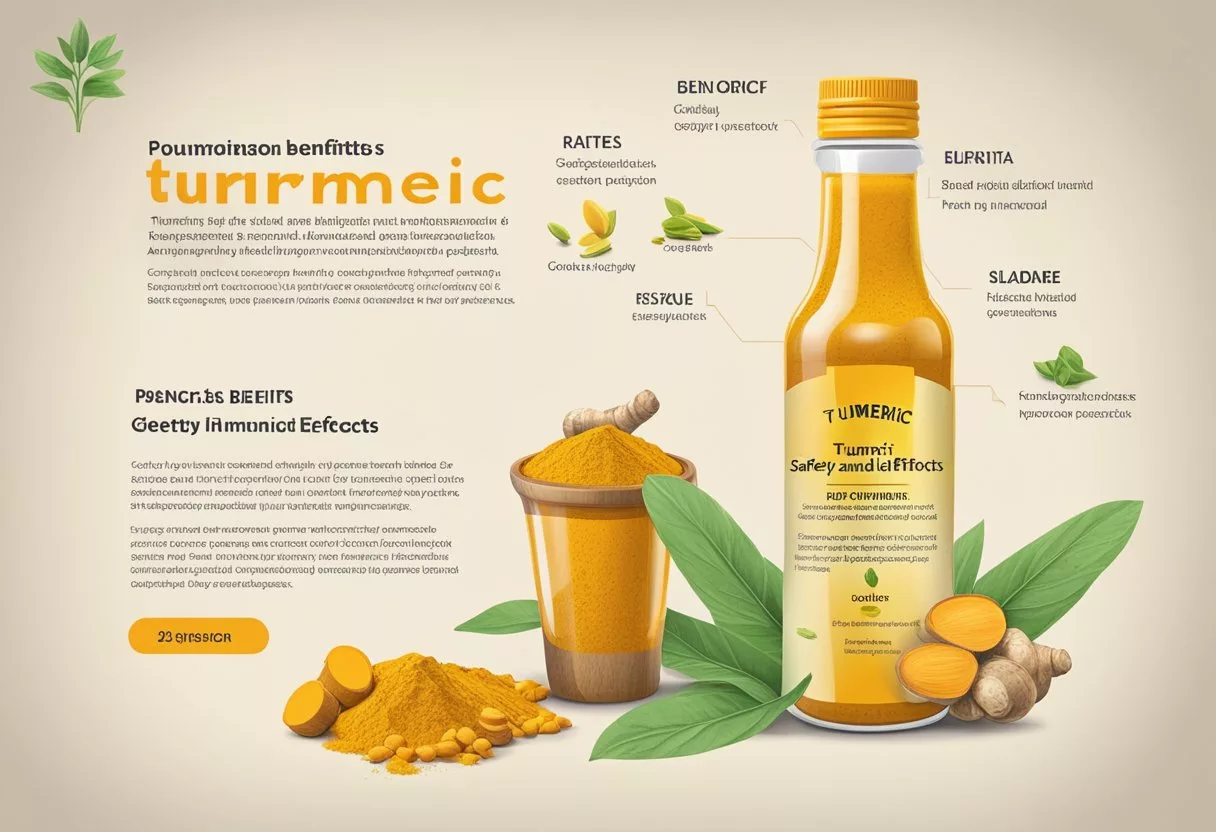Turmeric, a vibrant yellow-orange spice, has garnered attention for its potential health benefits. Traditionally used in Indian cuisine and Ayurvedic medicine for thousands of years, it is not only a staple in the culinary world but also has a significant cultural impact.
The primary active component of turmeric is curcumin, which is known for its anti-inflammatory and antioxidant properties. Research has explored its role in supporting a healthy inflammatory response, which can benefit a wide range of health conditions.

Beyond its role in inflammation and as an antioxidant, turmeric has been studied for its potential to support digestive health, aid in blood sugar management, and contribute to cancer prevention. Its use in food as a spice adds flavor and color, making it an enjoyable addition to many dishes. While research is still ongoing, the current evidence suggests that incorporating turmeric into one’s diet can offer various health advantages.
Key Takeaways
- Turmeric is recognized for its anti-inflammatory and antioxidant effects.
- It may play a role in supporting digestive health and managing blood sugar levels.
- Adding turmeric to your diet can contribute to overall health, but it’s important to be mindful of safety and any potential side effects.
Nutritional Profile and Components of Turmeric

Turmeric, a golden spice renowned for its use in cuisine and medicine, has a complex nutritional profile. Its components, from vitamins to the renowned active compound curcumin, contribute to its health benefits.
Curcumin – The Active Compound in Turmeric
Curcumin is the principal bioactive substance in turmeric, belonging to a group of compounds called curcuminoids. It has garnered attention for its antioxidant and anti-inflammatory properties. Curcumin content can vary in fresh turmeric, powdered forms, and supplements, but it generally makes up about 2-8% of the spice.
Turmeric’s Vitamins and Minerals
Turmeric is not only known for its active compound but also its nutritional value. It contains:
- Proteins and fatty acids: Essential for various bodily functions.
- Manganese: A spoonful of turmeric powder provides a significant amount of the daily value.
- Potassium: Important for maintaining proper heart function and regulating fluid balance.
- Iron: Essential for blood production in the body.
Enhancing Absorption of Curcumin
Curcumin’s bioavailability can be limited due to its poor absorption and rapid metabolism in the liver and intestinal wall. However, the presence of piperine, a compound found in black pepper, can enhance the absorption of curcumin by up to 2,000%. Therefore, combining turmeric with black pepper can significantly increase its health benefits.
Health Benefits of Turmeric

Turmeric boasts a variety of health benefits, primarily attributed to its main active ingredient, curcumin. This section explores the impact of turmeric on inflammation, oxidative stress, joint health, cardiovascular function, and cognitive abilities.
Anti-inflammatory Properties
Turmeric’s anti-inflammatory capabilities stem from curcumin, which has been shown to match the effectiveness of some anti-inflammatory drugs without the side effects. Curcumin targets multiple steps in the inflammatory pathway at the molecular level.
Antioxidant Effects and Free Radicals
Curcumin is also a potent antioxidant that neutralizes free radicals due to its chemical structure. Moreover, curcumin boosts the body’s own antioxidant enzymes, amplifying its defensive potential against oxidative stress.
Support for Joint Health
Individuals with joint pain, particularly from conditions like rheumatoid arthritis and osteoarthritis, may find relief with turmeric. The anti-inflammatory nature of curcumin helps reduce painful inflammation and swelling in joint tissues.
Heart Health and Blood Pressure
The spice is beneficial for heart health by improving the endothelial function of blood vessels, potentially reducing cholesterol levels and high blood pressure, factors linked to heart disease. Additionally, its anti-inflammatory and antioxidant properties may help prevent blood clotting.
Brain Health and Cognitive Function
Curcumin increases levels of brain-derived neurotrophic factor (BDNF), which is vital for brain health. Higher BDNF levels may reduce the risk of brain diseases like Alzheimer’s and improve symptoms of depression. Moreover, turmeric’s ability to reduce inflammation and oxidative stress is also thought to benefit those with depression.
Turmeric in Cancer Prevention and Support

Turmeric, and specifically its active compound curcumin, has garnered attention for its potential role in cancer prevention and as a support in cancer management due to its anti-inflammatory and antioxidant properties.
Effects on Cancer Cells
Scientific investigations suggest that curcumin can influence cancer cells. Laboratory studies have shown that curcumin may inhibit the growth of various cancer cells, including those of lung, breast, and prostate cancers. The mechanism appears to involve curcumin’s ability to induce apoptosis (cell death) in cancer cells and reduce the spread of these cells. Furthermore, it may interfere with the growth of colorectal cancer cells, indicating a potential therapeutic role.
Chemopreventive Potential
Curcumin’s chemopreventive potential is linked to its anti-inflammatory and antioxidant actions which can help combat the cellular damage and chronic inflammation known to contribute to cancer development. While these findings are promising, the research is ongoing, and there is yet to be a consensus on the efficacy of curcumin for the prevention or treatment of cancer. Curcumin’s bioavailability, or the extent to which it can be absorbed and used by the body, is a current topic of research to optimize its potential benefits.
Managing Digestive Health

Turmeric, known for its vibrant yellow hue, is often associated with supporting the digestive system. The spice’s active component, curcumin, is recognized for its anti-inflammatory properties, which can be beneficial in managing various digestive issues.
Inflammation is a critical response of the digestive system to injury or irritation. However, excessive inflammation can lead to discomfort and a range of digestive problems. Curcumin’s anti-inflammatory actions may help soothe the digestive tract, thereby potentially easing symptoms related to inflammatory digestive conditions.
The role of turmeric in digestion includes:
- Relaxing Digestive Muscles: It is suggested that curcumin may assist in relaxing the smooth muscles of the digestive walls, promoting the efficient movement of food through the intestines.
- Reducing Bloating and Gas: By supporting smooth muscle function, turmeric may also contribute to lessening the likelihood of gas and bloating as food is digested.
- Gastrointestinal Protection: The anti-inflammatory and antioxidant effects of turmeric may help protect the lining of the stomach and intestines, shielding cells from damage by free radicals.
While turmeric is a promising adjunct in managing digestive health, it is always recommended to consult healthcare professionals before using it as a complementary treatment, especially for those with existing health conditions or those taking other medications.
In summary, through its anti-inflammatory and soothing effects on the digestive system, turmeric may play a role in maintaining digestive health and managing related disorders.
Impact on Diabetes and Blood Sugar Levels

Turmeric, particularly its active compound curcumin, has been studied for its potential benefits in managing diabetes and regulating blood sugar levels. Research suggests that curcumin might help stabilize blood sugar, which is crucial for those with diabetes.
- Blood Sugar Management: Turmeric may aid in controlling glucose levels in the blood, which can help patients manage their glycemic control.
- Insulin Resistance Reduction: There is evidence to suggest that turmeric might ameliorate insulin resistance, thus potentially aiding in the management of type 2 diabetes.
Animal studies point to curcumin having a positive effect on blood sugar levels and insulin function. While findings are promising, it is essential to note that more research is needed, particularly human studies, to fully understand the efficacy and safety of turmeric in diabetes management.
The potential cholesterol-lowering effects of turmeric could also be beneficial, as diabetes is often linked with higher levels of blood lipids. Some studies have found decreases in levels of blood triglycerides, total cholesterol, and LDL (bad) cholesterol when subjects consumed turmeric.
It’s important for individuals considering turmeric supplementation to manage their blood sugar to consult with a healthcare provider. This is to ensure it does not interfere with existing treatments or medications and to establish a suitable dosage.
- Safety and Dosage: Always consult a healthcare professional before adding turmeric supplements to your regimen.
In conclusion, while turmeric shows potential for supporting blood sugar and improving diabetes outcomes, individuals should seek a medical consultation before use and consider turmeric as an adjunct to conventional treatment rather than a replacement.
Other Potential Benefits

Turmeric is renowned not only for its culinary use but also for its potential health benefits beyond its anti-inflammatory and antioxidant properties. The following subsections explore its impact on mental and skin health, and immune support.
Support for Mental Health
Research suggests that turmeric, and specifically its active compound curcumin, may benefit mental health. Curcumin has been studied for its potential role in combating depression and mood disorders. Some studies indicate that its anti-inflammatory and antioxidant effects could have an antidepressant-like impact.
Anti-Aging and Skin Health
Turmeric might play a role in skin health due to its anti-inflammatory properties, which can help with conditions like skin aging. Its antioxidant capacity also means it could protect against free radicals, molecules known to contribute to aging and skin damage.
Immune System and Infections
The spice’s potential effects on the immune system are attributed to its anti-inflammatory and antioxidant activities. These properties might assist the body in fighting off various types of infections, although more research is needed to fully understand this potential benefit.
How to Incorporate Turmeric in Your Diet

Incorporating turmeric into one’s diet can be accomplished through cooking, dietary supplements, and enhancing absorption with specific food combinations. Understanding the proper ways to use turmeric and its compound, curcumin, is essential for maximizing its health benefits.
Turmeric in Cooking
Turmeric can be easily integrated into daily meals. It’s commonly found as tumeric powder and used as a spice and seasoning.
- Curries: Sprinkle a teaspoon into your chicken or vegetable curries.
- Rice dishes: Add a vibrant color and flavor by including half a teaspoon in rice recipes.
- Soups: A dash of turmeric can enrich various soup flavors.
- eggs: Turmeric can be sprinkled onto scrambled eggs or omelets.
- Smoothies: For a nutritious kick, include a small amount in your smoothie blends.
- Golden milk: Combine with warm coconut milk for a comforting drink known as golden milk.
Turmeric Supplements and Dosage
Turmeric supplements are a convenient option for those seeking to include curcumin in their diet.
- Dosage: Consult with a registered dietitian or healthcare provider to determine the appropriate dosage, as excessive intake can lead to complications.
- Dietary Supplement: Choose supplements, that have been certified for purity and quality.
Combining Turmeric with Other Foods for Better Absorption
To maximize the absorption of turmeric and its active component, curcumin, it’s beneficial to combine it with specific foods.
- Black Pepper: Contains piperine, which can enhance curcumin absorption significantly.
- Fatty Foods: Curcumin is fat-soluble, so combining it with foods like avocado or using coconut milk in recipes can improve uptake.
Safety and Potential Side Effects

Turmeric, acclaimed for its anti-inflammatory properties and potential health benefits, may also pose risks and side effects. When considering turmeric as a supplement or a culinary spice, it is important to be aware of its possible interactions with medications and the limits to its consumption.
Possible Interactions with Medications
Turmeric contains curcumin, which can interact with a range of medications. Notably, turmeric may affect the efficacy of blood thinners like warfarin, increasing the risk of bleeding. It can also impact blood pressure medications, potentially altering their intended effects. Additionally, turmeric may interact with NSAIDs such as ibuprofen, possibly intensifying their side effects.
Limits and Side Effects of Turmeric
While turmeric is generally considered safe when consumed in the amounts typically used in food, higher doses found in supplements may lead to various side effects. In clinical studies, some participants have reported digestive issues, such as diarrhea or stomach discomfort, particularly at higher doses. Excess turmeric intake may also act as a blood thinner, paralleling the effects of certain medications. It is important for individuals considering turmeric supplements to start with smaller doses and monitor for any adverse reactions which, while rare, are important to recognize.
Historical and Cultural Significance

Turmeric, derived from the Curcuma longa plant, holds a place of distinction in India, both as a cornerstone in culinary practices and in Ayurvedic medicine. This vibrant spice is not only celebrated for its flavor but also for its therapeutic attributes.
Turmeric in Ayurvedic Medicine
In Ayurveda, the traditional medicine system of India, turmeric has been used for thousands of years. It is commonly referred to as the “Golden Spice” for its deep yellow-orange color and is believed to balance the three doshas (life forces)—Vata, Pitta, and Kapha. The active compound in turmeric, curcumin, is credited with a wide range of health benefits, which include anti-inflammatory and antioxidant properties. Ayurvedic texts prescribe turmeric for a variety of health conditions, such as to improve digestion, alleviate pain, and enhance the immune system.
The Use of Turmeric in Indian Cuisine
In Indian cuisine, turmeric is ubiquitous. It’s a key ingredient in myriad dishes, especially curries, where it imparts a warm, earthy flavor and a distinctive golden hue. Beyond its role in flavoring and coloring food, turmeric powder serves as an essential spice that has shaped the culinary identity of India. It is seamlessly integrated into the daily diet, reflecting a profound understanding of its health benefits and its position in India’s cultural heritage. The people of India embrace turmeric not just as a spice, but as an integral part of their history and daily lives.
Conclusion
Turmeric, with its active compound curcumin, is widely recognized for its anti-inflammatory and antioxidant properties. Research suggests multiple health benefits ranging from reducing symptoms of arthritis to aiding in metabolic syndrome management.
- Antioxidant capabilities contribute to cellular health.
- Its anti-inflammatory effects may alleviate conditions such as arthritis.
- Curcumin has potential roles in heart health and gastrointestinal function.
It is recommended to incorporate turmeric into one’s diet as a spice, which can be both flavorful and beneficial. However, moderation is key, and in cases of supplementation, one should seek medical advice, as excessive consumption could lead to adverse effects.
For those with inflammatory conditions or looking to enhance their overall health through dietary changes, turmeric is a viable natural option to consider. Although not a cure-all, its contributions to a healthy lifestyle are supported by scientific evidence. Users should always aim for a balanced approach, integrating turmeric within the broader context of a nutritious diet and active living.
Frequently Asked Questions
This section addresses some of the most common inquiries regarding turmeric’s health benefits and uses, backing up the answers with scientific understanding and culinary practice.
What are the known benefits of consuming turmeric on a daily basis?
Regular consumption of turmeric can offer anti-inflammatory benefits, potentially improving conditions like arthritis. It also contains antioxidants and may enhance brain health and help in reducing the risk of chronic diseases.
Can turmeric intake improve sexual health, and if so, how?
While there is limited research in this area, turmeric’s potential to improve blood flow and reduce inflammation may suggest benefits for sexual health as well. However, more studies are needed to confirm these effects.
What are the potential risks or contraindications associated with turmeric supplementation?
Turmeric supplementation can interact with certain medications like blood thinners and diabetes drugs. High doses may cause gastrointestinal issues or negatively affect liver function.
How does turmeric contribute to skin health, and what are its uses in skincare?
Turmeric can contribute to skin health by its anti-inflammatory and antimicrobial properties, potentially helping with conditions such as acne and eczema. It’s often used in face masks and skincare products.
In what ways can turmeric be integrated into cooking for both taste and health?
Turmeric can be added to soups, stews, rice dishes, and smoothies to impart a warm flavor and color. Its bioactive compounds can withstand the cooking process, maintaining its health benefits.
Which organ systems particularly benefit from the inclusion of turmeric in one’s diet?
The digestive and immune systems benefit notably from turmeric’s anti-inflammatory and antioxidant properties, with some evidence suggesting benefits for the cardiovascular system through improving blood vessel function.